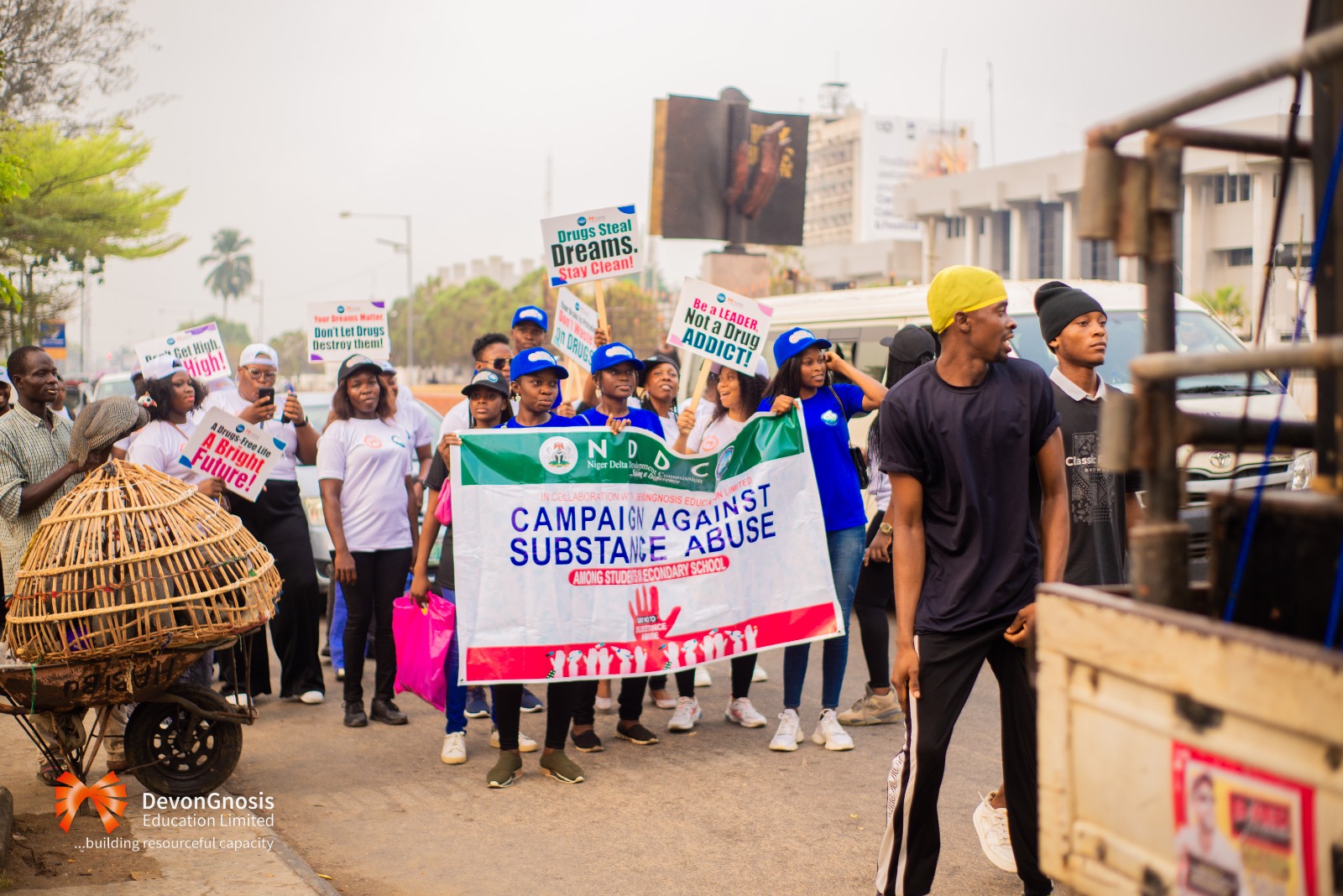Health
NDDC Takes the Lead in Combating Drug Abuse in Calabar Schools

The Niger Delta Development Commission (NDDC) has taken a bold step in combating substance abuse among youths by launching a statewide awareness campaign in selected secondary schools across Calabar, Cross River State.
The initiative, held at the West African People Institute (WAPI), was executed in collaboration with Devongnosis Education Limited and key stakeholders, including government agencies, security bodies, and educational institutions. Its primary goal is to educate students on the dangers of drug abuse, empower them to make informed decisions, and establish student ambassadors to champion the cause
Declaring the event open, Dr. Eme Inyangabia, Assistant Director at NDDC, expressed deep concern over the alarming rise in drug and substance abuse among secondary school students. She reaffirmed the commission’s unwavering commitment to tackling the issue with renewed vigor.
Similarly, Nnadi Roseline Ada, Deputy Commander of the Drug Demand Reduction Unit at the National Drug Law Enforcement Agency (NDLEA) Cross River State Command, linked substance abuse to increasing mental health issues and academic decline. She warned that the future of young Nigerians is at significant risk if urgent measures are not taken to curb the menace.
One of the most powerful moments of the event was a firsthand account from a former drug addict who shared his nine-year battle with substance abuse and his journey to recovery. Speaking anonymously, he urged students to stay away from drugs, emphasizing that not everyone gets a second chance at recovery.
Stakeholders at the event called for the campaign to be expanded to more schools beyond Calabar. They advocated for continuous engagement through mentorship programs, peer education, and increased parental involvement. Additionally, they stressed the importance of strengthening rehabilitation and counseling services to support affected students.
This initiative underscores NDDC’s commitment to building a healthier and drug-free future for Nigerian youths, ensuring they are equipped with the knowledge and resources to make positive life choices.
Health
Experts call for pharma sector harmonisation

Health sector experts have called for the harmonisation of pharmaceutical activities in Nigeria to eliminate duplication, enhance efficiency, and improve access to quality medicines and health products.
The call was made on Wednesday in Abuja during a high-level stakeholders’ engagement focused on aligning efforts under the Improving Access to Medicines through Policy and Technical Support (IMPACT) project.
Dr Tayo Hamzat, Supply Chain Management Officer at the World Health Organisation (WHO), said the engagement was timely, considering the number of ongoing but uncoordinated interventions in the sector.
“Harmonisation will lead to faster access to health products, lower costs, improved efficiency, and better regulatory oversight.
“It requires collaboration and a focus on strengthening national systems.”
He described Nigeria’s pharmaceutical system as “robust and huge” but hindered by weak coordination and fragmented management structures.
Dr Francis Ohanyido, Director-General of the West Africa Institute of Public Health, said such collaboration was “common sense” given limited development financing and the need to optimise resources.
“Market shaping is a critical tool.
“Harmonisation can help us identify clear gaps we need to fill, especially in preparation for the African Continental Free Trade Area (AfCFTA),” he said.
Dr Anthony Ayeke, Programme Manager for Health and Nutrition at the EU Delegation to Nigeria and ECOWAS, reaffirmed the EU’s commitment to supporting a resilient, locally driven pharmaceutical sector.
“Harmonisation can accelerate local production, reduce import dependency, and improve healthcare system resilience,” he noted.
He also recommended regulatory streamlining, value chain capacity building, innovation, and public-private partnerships.
Dr Abdu Mukhtar, National Coordinator of the Pharmaceutical Value Chain Transformation Committee (PVAC), commended ongoing efforts under the IMPACT project.
Represented by Dr Muhammad Balarabe, Technical Associate at PVAC, he emphasised the committee’s focus on catalysing local production and attracting sustainable investment.
“Let’s use this platform to strengthen partnerships and align interventions with the vision of affordable, high-quality healthcare for all Nigerians,” he said.
Dr Obi Adigwe, Director-General of the National Institute for Pharmaceutical Research and Development (NIPRD), said fragmented interventions and redundant regulations had long stunted growth in the sector.
Represented by Prof. Philip Builders, Professor of Pharmaceutics at NIPRD he said: “Equitable access to quality medicine is the foundation of universal healthcare.
“The lack of access is not just a health issue; it’s about equity, national security, and economic survival.
“Harmonisation isn’t just about avoiding duplication; it’s about aligning policy, investment, and technical frameworks to achieve measurable results.”
He urged stakeholders to develop practical short, medium, and long-term strategies to make Nigeria’s pharmaceutical sector self-reliant, globally competitive, and able to meet national healthcare demands.
The meeting brought together key government agencies, development partners, and private sector actors, each reaffirming a shared commitment to a unified, efficient pharmaceutical ecosystem in Nigeria.
NAN
-

 Featured6 years ago
Featured6 years agoLampard Names New Chelsea Manager
-

 Featured5 years ago
Featured5 years agoFG To Extends Lockdown In FCT, Lagos Ogun states For 7days
-

 Featured6 years ago
Featured6 years agoChildren Custody: Court Adjourns Mike Ezuruonye, Wife’s Case To April 7
-

 Featured6 years ago
Featured6 years agoNYSC Dismisses Report Of DG’s Plan To Islamize Benue Orientation Camp
-

 Featured4 years ago
Featured4 years agoTransfer Saga: How Mikel Obi Refused to compensate me After I Linked Him Worth $4m Deal In Kuwait SC – Okafor
-
Sports3 years ago
TINUBU LAMBAST DELE MOMODU
-

 News9 months ago
News9 months agoZulu to Super Eagles B team, President Tinubu is happy with you
-
Featured6 years ago
Board urges FG to establish one-stop rehabilitation centres in 6 geopolitical zones
